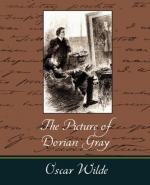And, certainly, to him life itself was the first, the greatest, of the arts, and for it all the other arts seemed to be but a preparation. Fashion, by which what is really fantastic becomes for a moment universal, and dandyism, which, in its own way, is an attempt to assert the absolute modernity of beauty, had, of course, their fascination for him. His mode of dressing, and the particular styles that from time to time he affected, had their marked influence on the young exquisites of the Mayfair balls and Pall Mall club windows, who copied him in everything that he did, and tried to reproduce the accidental charm of his graceful, though to him only half-serious, fopperies.
For, while he was but too ready to accept the position that was almost immediately offered to him on his coming of age, and found, indeed, a subtle pleasure in the thought that he might really become to the London of his own day what to imperial Neronian Rome the author of the Satyricon once had been, yet in his inmost heart he desired to be something more than a mere arbiter elegantiarum, to be consulted on the wearing of a jewel, or the knotting of a necktie, or the conduct of a cane. He sought to elaborate some new scheme of life that would have its reasoned philosophy and its ordered principles, and find in the spiritualizing of the senses its highest realization.
The worship of the senses has often, and with much justice, been decried, men feeling a natural instinct of terror about passions and sensations that seem stronger than themselves, and that they are conscious of sharing with the less highly organized forms of existence. But it appeared to Dorian Gray that the true nature of the senses had never been understood, and that they had remained savage and animal merely because the world had sought to starve them into submission or to kill them by pain, instead of aiming at making them elements of a new spirituality, of which a fine instinct for beauty was to be the dominant characteristic. As he looked back upon man moving through history, he was haunted by a feeling of loss. So much had been surrendered! and to such little purpose! There had been mad wilful rejections, monstrous forms of self-torture and self-denial, whose origin was fear and whose result was a degradation infinitely more terrible than that fancied degradation from which, in their ignorance, they had sought to escape; Nature, in her wonderful irony, driving out the anchorite to feed with the wild animals of the desert and giving to the hermit the beasts of the field as his companions.
Yes: there was to be, as Lord Henry had prophesied, a new Hedonism that was to recreate life and to save it from that harsh uncomely puritanism that is having, in our own day, its curious revival. It was to have its service of the intellect, certainly, yet it was never to accept any theory or system that would involve the sacrifice of any mode of passionate experience. Its aim, indeed, was to be experience itself, and not the fruits of experience, sweet or bitter as they might be. Of the asceticism that deadens the senses, as of the vulgar profligacy that dulls them, it was to know nothing. But it was to teach man to concentrate himself upon the moments of a life that is itself but a moment.




